人教版九年级全册 Unit 1 How can we become good learners第3课时Section A说课课件(共31张PPT)
文档属性
| 名称 | 人教版九年级全册 Unit 1 How can we become good learners第3课时Section A说课课件(共31张PPT) |
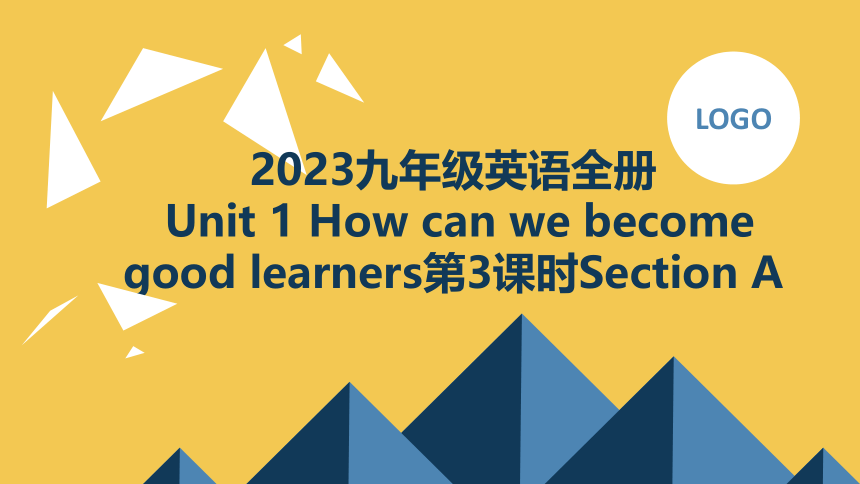
|
|
| 格式 | pptx | ||
| 文件大小 | 1.1MB | ||
| 资源类型 | 教案 | ||
| 版本资源 | 人教新目标(Go for it)版 | ||
| 科目 | 英语 | ||
| 更新时间 | 2023-07-08 00:00:00 | ||
图片预览

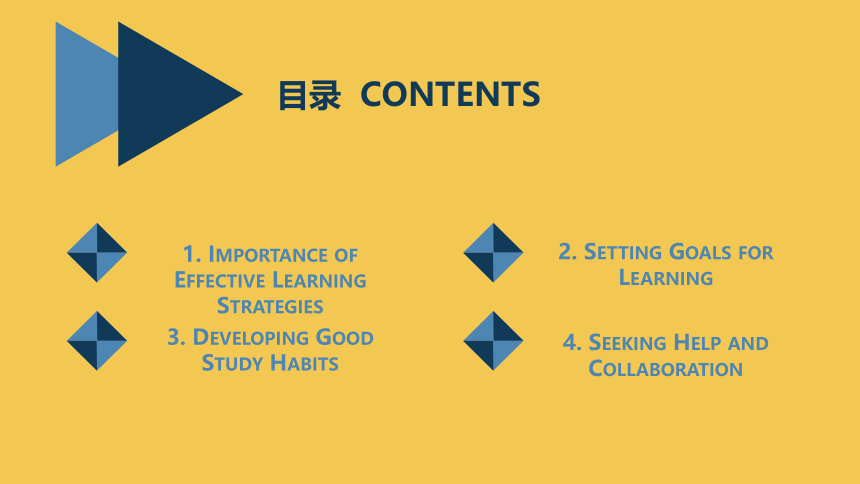

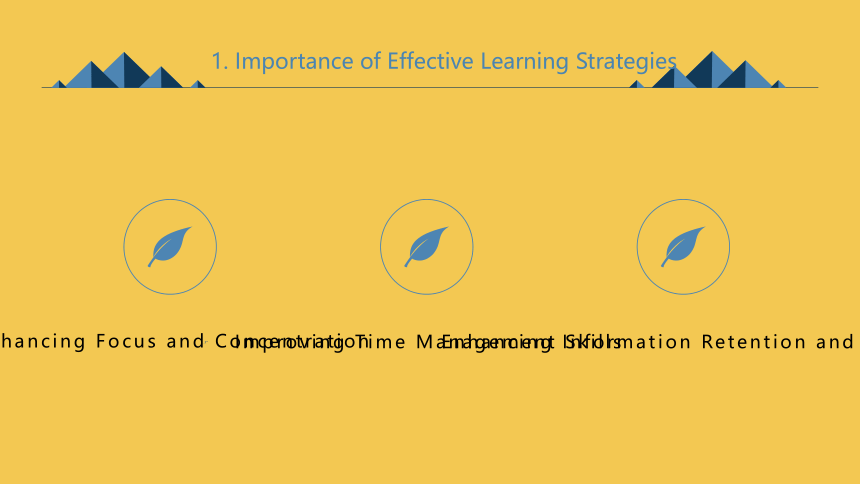
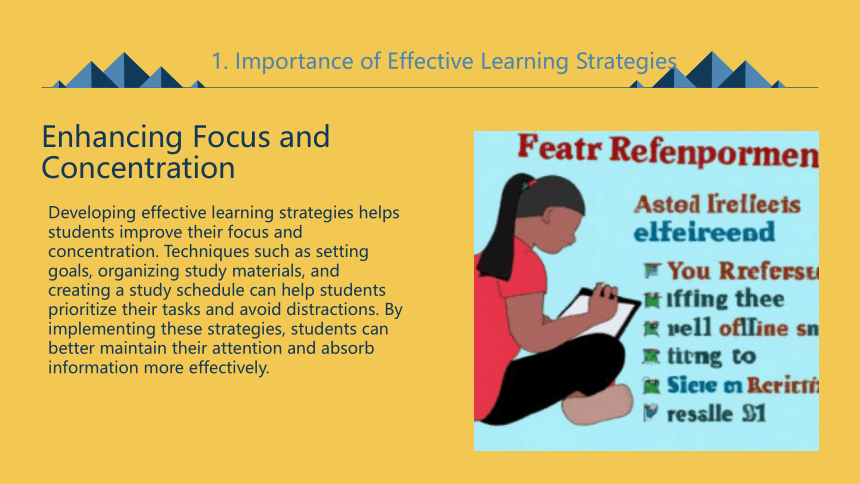
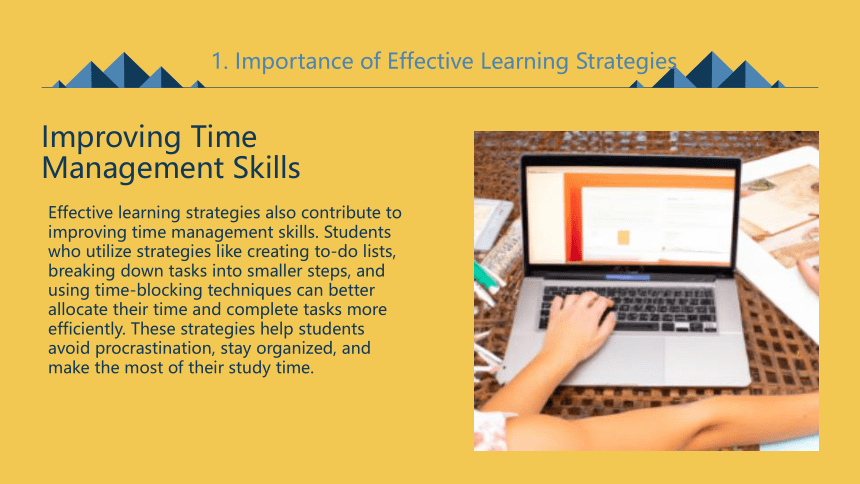
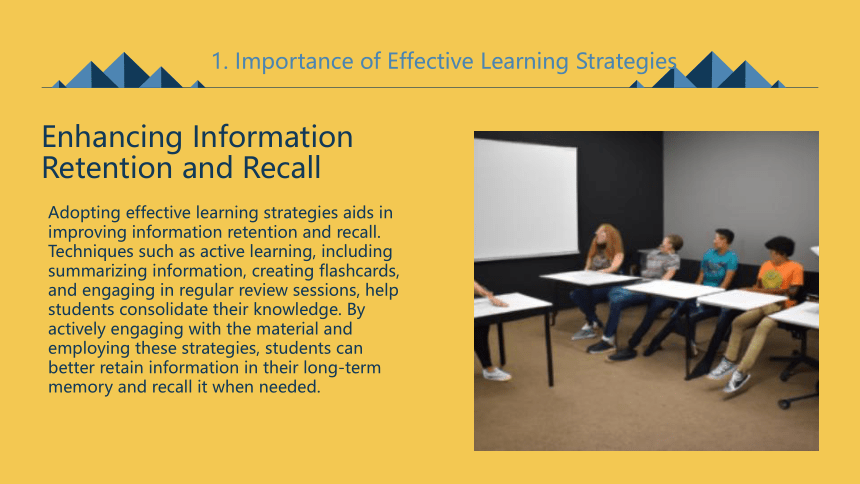
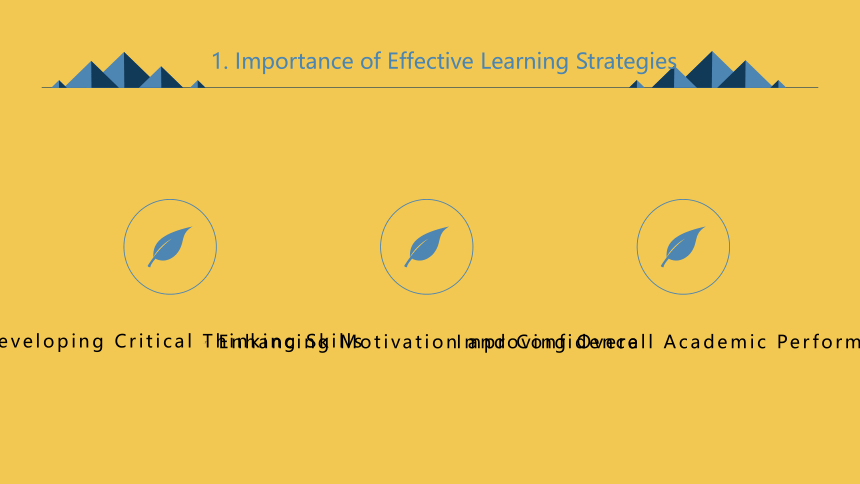
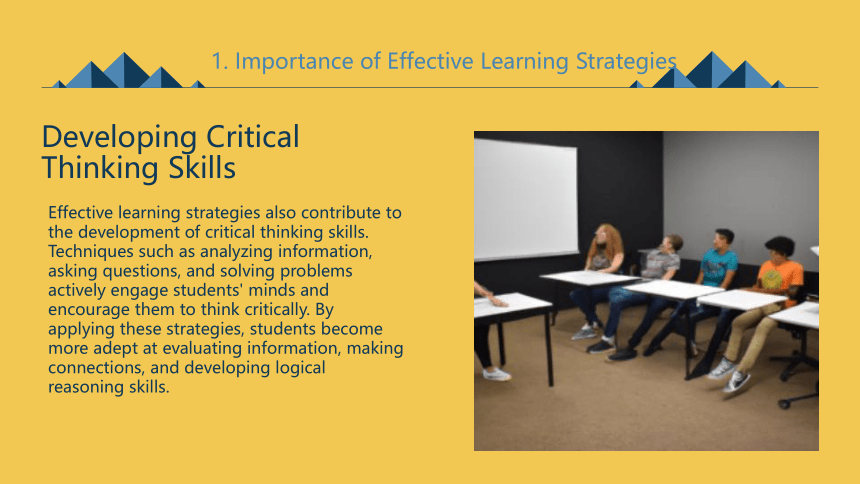
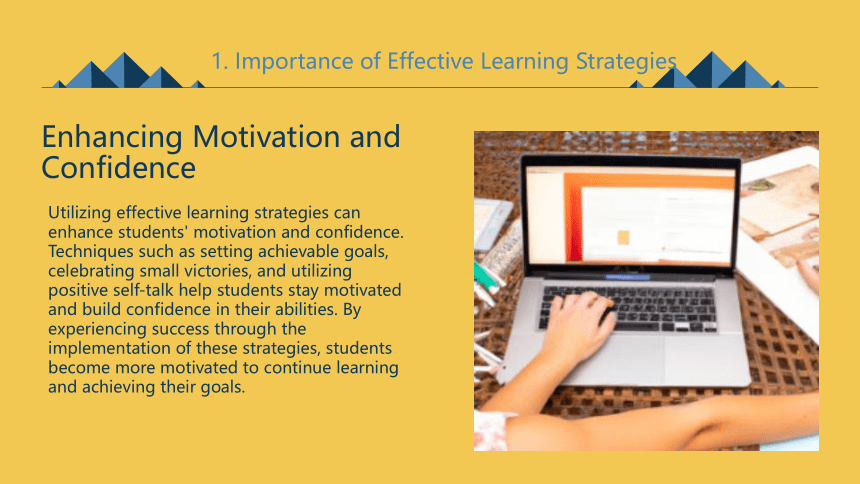
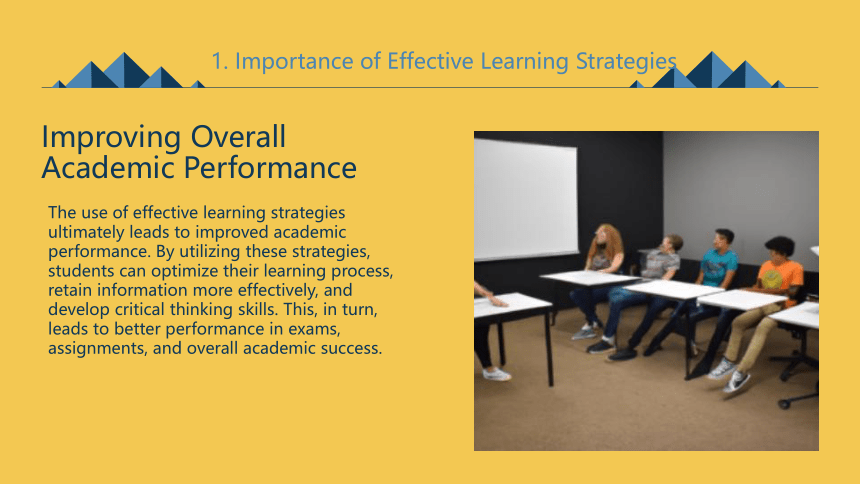
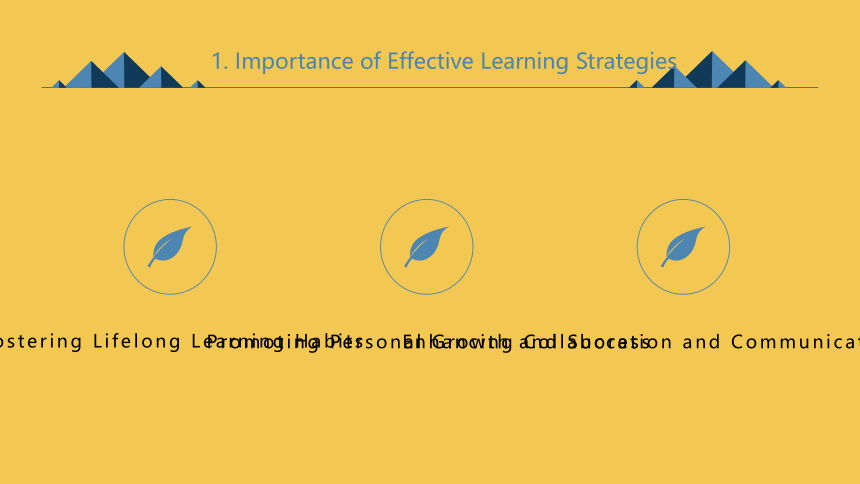
文档简介
(共31张PPT)
2023九年级英语全册
Unit 1 How can we become good learners第3课时Section A
LOGO
目录 CONTENTS
2. setting goals for learning
3. developing good study habits
4. seeking help and collaboration
1. importance of effective learning strategies
1. importance of effective learning strategies
1
1. Importance of Effective Learning Strategies
Improving Time Management Skills
Enhancing Focus and Concentration
Enhancing Information Retention and Recall
Enhancing Focus and Concentration
Developing effective learning strategies helps students improve their focus and concentration. Techniques such as setting goals, organizing study materials, and creating a study schedule can help students prioritize their tasks and avoid distractions. By implementing these strategies, students can better maintain their attention and absorb information more effectively.
1. Importance of Effective Learning Strategies
Improving Time Management Skills
Effective learning strategies also contribute to improving time management skills. Students who utilize strategies like creating to-do lists, breaking down tasks into smaller steps, and using time-blocking techniques can better allocate their time and complete tasks more efficiently. These strategies help students avoid procrastination, stay organized, and make the most of their study time.
1. Importance of Effective Learning Strategies
Enhancing Information Retention and Recall
Adopting effective learning strategies aids in improving information retention and recall. Techniques such as active learning, including summarizing information, creating flashcards, and engaging in regular review sessions, help students consolidate their knowledge. By actively engaging with the material and employing these strategies, students can better retain information in their long-term memory and recall it when needed.
1. Importance of Effective Learning Strategies
1. Importance of Effective Learning Strategies
Enhancing Motivation and Confidence
Developing Critical Thinking Skills
Improving Overall Academic Performance
Developing Critical Thinking Skills
Effective learning strategies also contribute to the development of critical thinking skills. Techniques such as analyzing information, asking questions, and solving problems actively engage students' minds and encourage them to think critically. By applying these strategies, students become more adept at evaluating information, making connections, and developing logical reasoning skills.
1. Importance of Effective Learning Strategies
Enhancing Motivation and Confidence
Utilizing effective learning strategies can enhance students' motivation and confidence. Techniques such as setting achievable goals, celebrating small victories, and utilizing positive self-talk help students stay motivated and build confidence in their abilities. By experiencing success through the implementation of these strategies, students become more motivated to continue learning and achieving their goals.
1. Importance of Effective Learning Strategies
Improving Overall Academic Performance
The use of effective learning strategies ultimately leads to improved academic performance. By utilizing these strategies, students can optimize their learning process, retain information more effectively, and develop critical thinking skills. This, in turn, leads to better performance in exams, assignments, and overall academic success.
1. Importance of Effective Learning Strategies
1. Importance of Effective Learning Strategies
Promoting Personal Growth and Success
Fostering Lifelong Learning Habits
Enhancing Collaboration and Communication Skills
Fostering Lifelong Learning Habits
Effective learning strategies also contribute to fostering lifelong learning habits. By incorporating these strategies into their study routine, students develop habits that enable them to continue learning and acquiring new knowledge beyond their formal education. They become independent learners who are equipped with the tools and techniques necessary for continuous personal and professional development.
1. Importance of Effective Learning Strategies
Promoting Personal Growth and Success
The adoption of effective learning strategies promotes personal growth and success. By cultivating skills such as focus, time management, critical thinking, motivation, and confidence, students develop qualities that are valuable not only in academics but also in various aspects of life. These skills contribute to personal growth, success in future endeavors, and the ability to adapt to different challenges and opportunities.
1. Importance of Effective Learning Strategies
1. Importance of Effective Learning Strategies
Equipping Students for Future Challenges
Cultivating a Positive Learning Environment
Enhancing Self-Reflection and Metacognition
Cultivating a Positive Learning Environment
Effective learning strategies contribute to cultivating a positive learning environment. By implementing these strategies, students become more engaged, motivated, and confident in their abilities. This positive mindset creates a conducive atmosphere for learning, encourages active participation, and fosters a supportive community of learners.
1. Importance of Effective Learning Strategies
Equipping Students for Future Challenges
Effective learning strategies equip students with the necessary skills and mindset to face future challenges. By developing skills such as critical thinking, time management, and information retention, students become better prepared to tackle complex problems, adapt to changing environments, and continue learning throughout their lives. These strategies provide a solid foundation for future success and personal growth.
1. Importance of Effective Learning Strategies
Enhancing Self-Reflection and Metacognition
Effective learning strategies also promote self-reflection and metacognition. Techniques such as self-assessment, setting learning goals, and evaluating one's own learning process encourage students to reflect on their strengths, weaknesses, and areas for improvement. By engaging in metacognitive practices, students become more aware of their learning strategies, make adjustments when necessary, and develop a deeper understanding of their own learning preferences and styles.
1. Importance of Effective Learning Strategies
2. setting goals for learning
2
2. Setting Goals for Learning
Realistic and Achievable Goals
Clear and Specific Goals
Time-Bound Goals
Clear and Specific Goals
Setting clear and specific goals is essential for becoming a good learner. When setting goals, it is important to be specific about what you want to achieve. For example, instead of saying "I want to improve my English," a clear and specific goal would be "I want to improve my English speaking skills by practicing conversation with native speakers for at least 30 minutes every day." Clear goals help to focus your efforts and provide a sense of direction in your learning journey.
2. Setting Goals for Learning
3. developing good study habits
3
3. Developing Good Study Habits
Active Learning
Time Management
Effective Note-Taking
Time Management
Developing good study habits requires effective time management skills. Allocate specific time slots for studying and stick to them. Avoid procrastination and distractions during study time. Prioritize tasks and create a study schedule to ensure that all subjects are covered.
3. Developing Good Study Habits
Active Learning
Engage in active learning methods to improve comprehension and retention. Instead of simply reading and memorizing, actively participate in the learning process. Take notes, summarize information, and ask questions. Discuss topics with peers or seek clarification from teachers to enhance understanding.
3. Developing Good Study Habits
Effective Note-Taking
Develop effective note-taking techniques to maximize learning. Use abbreviations, symbols, and diagrams to condense information. Organize notes by topic and create summaries for each subject. Review and revise notes regularly to reinforce learning. Experiment with different note-taking styles to find the most effective method for you.
3. Developing Good Study Habits
4. seeking help and collaboration
4
4. Seeking Help and Collaboration
Building a support network
Effective communication
Collaborative learning
Effective communication
Good learners seek help and collaborate with others by effectively communicating their needs and ideas. They ask questions, express their thoughts clearly, and actively listen to others. This helps them gain a better understanding of the subject matter and learn from different perspectives.
4. Seeking Help and Collaboration
Building a support network
Good learners understand the importance of building a support network. They actively seek out teachers, classmates, and mentors who can help them with their learning journey. They are not afraid to ask for assistance when needed and value the input and guidance of others.
4. Seeking Help and Collaboration
Collaborative learning
Good learners recognize the benefits of collaborative learning. They actively participate in group discussions, projects, and activities. They contribute their ideas, listen to others' opinions, and work together to solve problems. Collaborative learning enhances their understanding, promotes critical thinking, and fosters teamwork skills.
4. Seeking Help and Collaboration
2023九年级英语全册
Unit 1 How can we become good learners第3课时Section A
LOGO
目录 CONTENTS
2. setting goals for learning
3. developing good study habits
4. seeking help and collaboration
1. importance of effective learning strategies
1. importance of effective learning strategies
1
1. Importance of Effective Learning Strategies
Improving Time Management Skills
Enhancing Focus and Concentration
Enhancing Information Retention and Recall
Enhancing Focus and Concentration
Developing effective learning strategies helps students improve their focus and concentration. Techniques such as setting goals, organizing study materials, and creating a study schedule can help students prioritize their tasks and avoid distractions. By implementing these strategies, students can better maintain their attention and absorb information more effectively.
1. Importance of Effective Learning Strategies
Improving Time Management Skills
Effective learning strategies also contribute to improving time management skills. Students who utilize strategies like creating to-do lists, breaking down tasks into smaller steps, and using time-blocking techniques can better allocate their time and complete tasks more efficiently. These strategies help students avoid procrastination, stay organized, and make the most of their study time.
1. Importance of Effective Learning Strategies
Enhancing Information Retention and Recall
Adopting effective learning strategies aids in improving information retention and recall. Techniques such as active learning, including summarizing information, creating flashcards, and engaging in regular review sessions, help students consolidate their knowledge. By actively engaging with the material and employing these strategies, students can better retain information in their long-term memory and recall it when needed.
1. Importance of Effective Learning Strategies
1. Importance of Effective Learning Strategies
Enhancing Motivation and Confidence
Developing Critical Thinking Skills
Improving Overall Academic Performance
Developing Critical Thinking Skills
Effective learning strategies also contribute to the development of critical thinking skills. Techniques such as analyzing information, asking questions, and solving problems actively engage students' minds and encourage them to think critically. By applying these strategies, students become more adept at evaluating information, making connections, and developing logical reasoning skills.
1. Importance of Effective Learning Strategies
Enhancing Motivation and Confidence
Utilizing effective learning strategies can enhance students' motivation and confidence. Techniques such as setting achievable goals, celebrating small victories, and utilizing positive self-talk help students stay motivated and build confidence in their abilities. By experiencing success through the implementation of these strategies, students become more motivated to continue learning and achieving their goals.
1. Importance of Effective Learning Strategies
Improving Overall Academic Performance
The use of effective learning strategies ultimately leads to improved academic performance. By utilizing these strategies, students can optimize their learning process, retain information more effectively, and develop critical thinking skills. This, in turn, leads to better performance in exams, assignments, and overall academic success.
1. Importance of Effective Learning Strategies
1. Importance of Effective Learning Strategies
Promoting Personal Growth and Success
Fostering Lifelong Learning Habits
Enhancing Collaboration and Communication Skills
Fostering Lifelong Learning Habits
Effective learning strategies also contribute to fostering lifelong learning habits. By incorporating these strategies into their study routine, students develop habits that enable them to continue learning and acquiring new knowledge beyond their formal education. They become independent learners who are equipped with the tools and techniques necessary for continuous personal and professional development.
1. Importance of Effective Learning Strategies
Promoting Personal Growth and Success
The adoption of effective learning strategies promotes personal growth and success. By cultivating skills such as focus, time management, critical thinking, motivation, and confidence, students develop qualities that are valuable not only in academics but also in various aspects of life. These skills contribute to personal growth, success in future endeavors, and the ability to adapt to different challenges and opportunities.
1. Importance of Effective Learning Strategies
1. Importance of Effective Learning Strategies
Equipping Students for Future Challenges
Cultivating a Positive Learning Environment
Enhancing Self-Reflection and Metacognition
Cultivating a Positive Learning Environment
Effective learning strategies contribute to cultivating a positive learning environment. By implementing these strategies, students become more engaged, motivated, and confident in their abilities. This positive mindset creates a conducive atmosphere for learning, encourages active participation, and fosters a supportive community of learners.
1. Importance of Effective Learning Strategies
Equipping Students for Future Challenges
Effective learning strategies equip students with the necessary skills and mindset to face future challenges. By developing skills such as critical thinking, time management, and information retention, students become better prepared to tackle complex problems, adapt to changing environments, and continue learning throughout their lives. These strategies provide a solid foundation for future success and personal growth.
1. Importance of Effective Learning Strategies
Enhancing Self-Reflection and Metacognition
Effective learning strategies also promote self-reflection and metacognition. Techniques such as self-assessment, setting learning goals, and evaluating one's own learning process encourage students to reflect on their strengths, weaknesses, and areas for improvement. By engaging in metacognitive practices, students become more aware of their learning strategies, make adjustments when necessary, and develop a deeper understanding of their own learning preferences and styles.
1. Importance of Effective Learning Strategies
2. setting goals for learning
2
2. Setting Goals for Learning
Realistic and Achievable Goals
Clear and Specific Goals
Time-Bound Goals
Clear and Specific Goals
Setting clear and specific goals is essential for becoming a good learner. When setting goals, it is important to be specific about what you want to achieve. For example, instead of saying "I want to improve my English," a clear and specific goal would be "I want to improve my English speaking skills by practicing conversation with native speakers for at least 30 minutes every day." Clear goals help to focus your efforts and provide a sense of direction in your learning journey.
2. Setting Goals for Learning
3. developing good study habits
3
3. Developing Good Study Habits
Active Learning
Time Management
Effective Note-Taking
Time Management
Developing good study habits requires effective time management skills. Allocate specific time slots for studying and stick to them. Avoid procrastination and distractions during study time. Prioritize tasks and create a study schedule to ensure that all subjects are covered.
3. Developing Good Study Habits
Active Learning
Engage in active learning methods to improve comprehension and retention. Instead of simply reading and memorizing, actively participate in the learning process. Take notes, summarize information, and ask questions. Discuss topics with peers or seek clarification from teachers to enhance understanding.
3. Developing Good Study Habits
Effective Note-Taking
Develop effective note-taking techniques to maximize learning. Use abbreviations, symbols, and diagrams to condense information. Organize notes by topic and create summaries for each subject. Review and revise notes regularly to reinforce learning. Experiment with different note-taking styles to find the most effective method for you.
3. Developing Good Study Habits
4. seeking help and collaboration
4
4. Seeking Help and Collaboration
Building a support network
Effective communication
Collaborative learning
Effective communication
Good learners seek help and collaborate with others by effectively communicating their needs and ideas. They ask questions, express their thoughts clearly, and actively listen to others. This helps them gain a better understanding of the subject matter and learn from different perspectives.
4. Seeking Help and Collaboration
Building a support network
Good learners understand the importance of building a support network. They actively seek out teachers, classmates, and mentors who can help them with their learning journey. They are not afraid to ask for assistance when needed and value the input and guidance of others.
4. Seeking Help and Collaboration
Collaborative learning
Good learners recognize the benefits of collaborative learning. They actively participate in group discussions, projects, and activities. They contribute their ideas, listen to others' opinions, and work together to solve problems. Collaborative learning enhances their understanding, promotes critical thinking, and fosters teamwork skills.
4. Seeking Help and Collaboration
同课章节目录
- Unit 1 How can we become good learners.
- Section A
- Section B
- Unit 2 I think that mooncakes are delicious!
- Section A
- Section B
- Unit 3 Could you please tell me where the restroom
- Section A
- Section B
- Unit 4 I used to be afraid of the dark.
- Section A
- Section B
- Unit 5 What are the shirts made of?
- Section A
- Section B
- Review of Units 1-5
- Unit 6 When was it invented?
- Section A
- Section B
- Unit 7 Teenagers should be allowed to choose their
- Section A
- Section B
- Unit 8 It must belong to Carla.
- Section A
- Section B
- Unit 9 I like music that I can dance to.
- Section A
- Section B
- Unit 10 You're supposed to shake hands.
- Section A
- Section B
- Review of Units 6-10
- Unit 11 Sad movies make me cry.
- Section A
- Section B
- Unit 12 Life is full of the unexpected
- Section A
- Section B
- Unit 13 We're trying to save the earth!
- Section A
- Section B
- Unit 14 I remember meeting all of you in Grade 7.
- Section A
- Section B
- Review of Units 11-14
